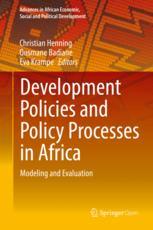

Most ebook files are in PDF format, so you can easily read them using various software such as Foxit Reader or directly on the Google Chrome browser.
Some ebook files are released by publishers in other formats such as .awz, .mobi, .epub, .fb2, etc. You may need to install specific software to read these formats on mobile/PC, such as Calibre.
Please read the tutorial at this link: https://ebookbell.com/faq
We offer FREE conversion to the popular formats you request; however, this may take some time. Therefore, right after payment, please email us, and we will try to provide the service as quickly as possible.
For some exceptional file formats or broken links (if any), please refrain from opening any disputes. Instead, email us first, and we will try to assist within a maximum of 6 hours.
EbookBell Team

0.0
0 reviewsThis book is open access under a CC BY 4.0 license.
The book examines the methodological challenges in analyzing the effectiveness of development policies. It presents a selection of tools and methodologies that can help tackle the complexities of which policies work best and why, and how they can be implemented effectively given the political and economic framework conditions of a country. The contributions in this book offer a continuation of the ongoing evidence-based debate on the role of agriculture and participatory policy processes in reducing poverty. They develop and apply quantitative political economy approaches by integrating quantitative models of political decision-making into existing economic modeling tools, allowing a more comprehensive growth-poverty analysis. The book addresses not only scholars who use quantitative policy modeling and evaluation techniques in their empirical or theoretical research, but also technical experts, including policy makers and analysts from stakeholder organizations, involved in formulating and implementing policies to reduce poverty and to increase economic and social well-being in African countries.